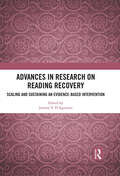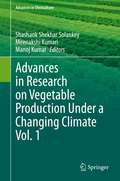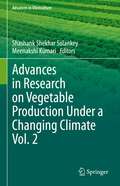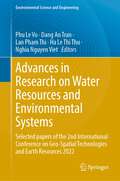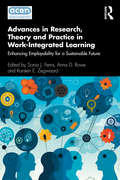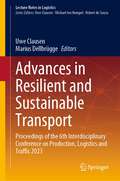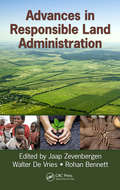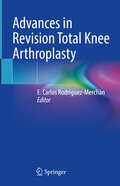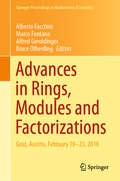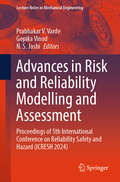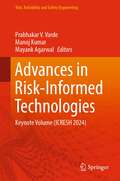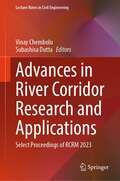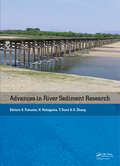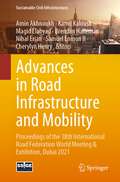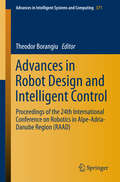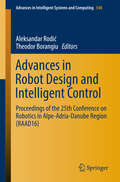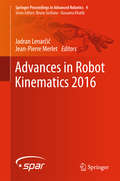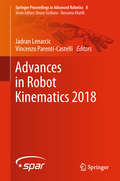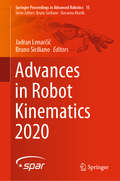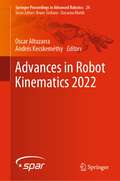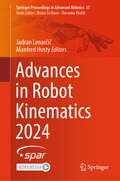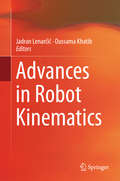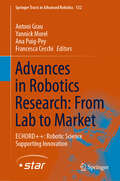- Table View
- List View
Advances in Research on Reading Recovery: Scaling and Sustaining an Evidence-Based Intervention
by Jerome V. D’AgostinoThere is no shortage of innovative educational programs – the challenge is learning how to scale and sustain those with strong evidence of effectiveness. This book focuses on Reading Recovery – one of the few educational innovations that has successfully expanded and established itself in several educational systems in the world. Developed by Marie Clay in New Zealand during the mid-1980s, Reading Recovery is an intensive intervention for young students who are struggling to learn how to read, and has expanded to several countries across the globe over the last 30 years. Providing evidence of the intervention’s effectiveness both in the short- and long-term, this volume presents in-depth studies to elucidate why the program is effective; discusses the trials and tribulations in scaling and sustaining the program; and approaches scaling and maintaining from theoretical and practical perspectives. The contributors to this book explain how Reading Recovery has established itself because it has maintained a strong focus on evidence; developed a deep sense of community among its practitioners; and was at the forefront in enhancing professional development of the teachers who delivered the intervention. Understanding the implementation experiences of the intervention is beneficial for any innovation developer who wishes to grow and sustain an intervention. The chapters in this book were originally published as articles in the Journal of Education for Students Placed At Risk.
Advances in Research on Vegetable Production Under a Changing Climate Vol. 1 (Advances in Olericulture)
by Manoj Kumar Shashank Shekhar Solankey Meenakshi KumariA considerable change in climate at a global level will impact the vegetable cultivation and agriculture as a whole; subsequently affecting the world's food supply. Climate change per se is not necessarily harmful; the problems arise from extreme events that are difficult to predict (erratic rainfall patterns and unpredictable high and low temperatures), and consequently reduce crop productivity. Vegetables are in general more succulent (have 90% water) and are more sensitive to climatic vagaries. Sudden changes in temperature coupled with irregular precipitation at any phase of crop growth can affect the normal growth, flowering, pollination, fruit setting, fruit development and fruit ripening can decrease the yield. The irregular precipitation can also affect the soil salinity and is a major challenge in many vegetable growing areas. To mitigate the harmful impact of climatic change there is a urgent need to develop adequate adaptation strategies for adverse effect of climate change and the preference should be given on development of heat, cold, drought, flood and salinity stress tolerant genotypes along with climate proofing through conventional and non-conventional breeding techniques. Available evidence shows that there is a high probability of increase in the frequency and intensity of climate related natural hazards due to climate change and hence increases the potential threat due to climate change related natural disasters in the world. This book (Volume- I) will be basically useful for the researchers and postgraduate students with current challenges and mitigation strategies for increasing vegetable production under a changing climate.
Advances in Research on Vegetable Production Under a Changing Climate Vol. 2 (Advances in Olericulture)
by Shashank Shekhar Solankey Meenakshi KumariThis second volume on the topic will be extremely useful for the researchers and postgraduate students working on vegetable crops with a special focus on climate change. Today, the entire world is suffering from global warming and its consequent, climate change. This has emerged as the most prominent global environmental issue and there is an urgent need to mitigate its impact on agriculture. Over the past 20 years South Asia has had a robust economic growth, yet it is home to more than one fourth of the world’s hunger and 40% of the world’s malnourished children and women. Persistent climatic variability, which results in frequent drought and flood, is among the major reasons for this phenomenon. Vegetables are in general more succulent (have 90% water) and more sensitive to climatic vagaries and sudden changes in temperature, as well as irregular precipitation at any phase of crop growing, can affect the normal growth, flowering, pollination, fruit setting, fruit development and fruit ripening which eventually decreases the yield. The irregular precipitation also causes the soil salinity and is a major challenge in many vegetable growing areas. To mitigate the harmful impact of climatic change there is an urgent need to develop adequate adaptation strategies for adverse effect of climate change and preference should be given to the development of heat, cold, drought, flood and salinity stress tolerant genotypes along with climate proofing through conventional and non-conventional breeding techniques, as well as exploiting the beneficial effects of CO2 enhancement on crop growth and yield. Available evidence shows that there is high probability of increase in the frequency and intensity of climate related natural hazards due to climate change and hence increase the potential threat due to climate change related natural disasters in the world. At present protected cultivation and grafted seedlings are also popularizing among vegetable growers because of the huge scope as well as, molecular breeding, emerging insect-pests & diseases and postharvest quality of vegetables under this climate change scenario. Moreover, underexploited vegetables, perennial vegetable and tuber crops have a more tolerant ability to climate vagaries compare to major vegetables which are also discussed in this book.
Advances in Research on Water Resources and Environmental Systems: Selected papers of the 2nd International Conference on Geo-Spatial Technologies and Earth Resources 2022 (Environmental Science and Engineering)
by Phu Le Vo Dang An Tran Thi Lan Pham Ha Le Thi Thu Nghia Nguyen VietThis book composes the proceedings of the international Conference on Geo-Spatial Technologies and Earth Resources (GTER 2022) which was co-organized by Hanoi University of Mining and Geology and the International Society for Mine Surveying (ISM) held at Hanoi city on October 13–14, 2022.GTER 2022 is technically co-sponsored by Vietnam Mining Science and Technology Association (VMST), Vietnam Association of Geodesy, Cartography and Remote Sensing (VGCR), Vietnam National Coal-Mineral Industries Holding Corporation Limited (VINACOMIN), and the Dong Bac Corporation (NECO).GTER 2022 aims to bring together experts, researchers, engineers, and policymakers to discuss and exchange their knowledge and experiences in recent advances research water resources and environmental systems.
Advances in Research, Theory and Practice in Work-Integrated Learning: Enhancing Employability for a Sustainable Future
by Sonia J. Ferns Anna D. Rowe Karsten E. ZegwaardWork-integrated learning (WIL) is a key strategy for enhancing student employability outcomes and lifelong learning capabilities. This timely publication critically reflects on existing scholarship and practice in WIL, discusses contemporary insights, provides a synopsis of resonating themes, and recommends areas for future research and practice. The book aims to position WIL as a strategic imperative for enabling a sustainable workforce through strengthening graduate capacity both in Australia and globally.The collection of edited scholarly chapters were compiled by 59 researchers, practitioners, and experts in WIL, and supported by the peak national professional body for WIL in Australia, the Australian Collaborative Education Network (ACEN). The chapters cover a range of pertinent topics such as teaching and learning, stakeholder engagement, maximizing learning outcomes, diverse forms of WIL practice, support and infrastructure, and future directions. Specific areas of interest include governance and leadership, student equity and wellbeing, quality and evaluation and interdisciplinary WIL. This book is essential reading for researchers, practitioners, workplace and community partners, university leaders, and policy makers, as the practice of WIL continues to expand in the higher education sector.
Advances in Resilient and Sustainable Transport: Proceedings of the 6th Interdisciplinary Conference on Production, Logistics and Traffic 2023 (Lecture Notes in Logistics)
by Uwe Clausen Marius DellbrüggeThis book reports on recent research and developments at the interface between the areas of production, logistics and traffic. Gathering the proceedings of the 6th ICPLT, held on March 22-23, 2023, at TU Dortmund University, in Germany, this volume gives a special emphasis to theories, trends and technologies for planning and operating freight transport systems in a sustainable and resilient way. The twenty-two contributions included in this book cover algorithms, models, and experimental methods to addresses challenges and knowledge gaps relating to traffic flows and logistic processes. They also report on advanced technologies, human factors research and strategies that should help better understand the interdependencies and conflicts of interest in the field of production, logistics and traffic, and to develop feasible solutions. All in all, this book provides a timely snapshot of research and developments concerning freight and public transport, cargo bikes, maritime and rail transport, electrical and hydrogen vehicles, simulation and optimization in production and logistics, production and supply chain management, sustainable logistics, and intralogistics and automation. It offers extensive information to researchers, engineers and other professionals, and public authorities that are active in all the above- mentioned fields.
Advances in Respiratory Cancerogenesis (Advances in Experimental Medicine and Biology #911)
by Mieczyslaw PokorskiLung cancer is the leading cause of mortality worldwide, with a low survival rate. Carcinogenesis generally requires a constellation of entwined steps, involving both innate cellular and environmental factors. This book shares the updated knowledge on the origin and development of cancer through genotypic changes which upset the physiological balance between cell proliferation, differentiation, growth control, and apoptosis. The emphasis is put on the role of microRNA proteins involved in the cellular processes above outlined. Cognitive changes, related to dysregulated cellular mechanisms in cancer cells, as yet unchartered area of research, also are tackled. A better understanding of the molecular and cellular biology of lung cancer is the key source of breakthroughs in the diagnosis and prognosis, and finding more effective therapies that target specific mutations. The book provides a source of current facts and trends in clinical research and practice. It will be of interest to clinicians, researchers, and other medical professionals.
Advances in Responsible Land Administration
by Jessica KeyesAdvances in Responsible Land Administration challenges conventional forms of land administration by introducing alternative approaches and provides the basis for a new land administration theory. A compilation of observations about responsible land administration in East Africa, it focuses on a new empirical foundation rather than preexisting ideal
Advances in Revision Total Knee Arthroplasty
by E. Carlos Rodríguez-MerchánThis book offers a comprehensive guide to revision total knee arthroplasty, a complex surgical procedure with increasing numbers due to the aging world's population. Covering both septic and aseptic prosthetic failure, it presents an updated overview of available surgical techniques – from one or two-stage revision for periprosthetic joint infection to robot-assisted total joint arthroplasty. Moreover, the authors explore the current role and future potentialities of artificial intelligence. This volume offers the reader state-of-the-art information aiming to illuminate contentious topics in the field.
Advances in Ring Theory and Applications: WARA22, Messina, Italy, July 18–20, 2022 (Springer Proceedings in Mathematics & Statistics #443)
by Mohammad Ashraf Vincenzo De Filippis Shakir Ali Nadeem Ur RehmanThe book intends to be a collection of research papers on algebra and related topics, most of which were presented at the international "Workshop on Associative Rings and Algebras with additional structures (WARA22)". The purpose of the workshop WARA22 was to present the current state of the art both in the Theory of Lie structures of associative rings and algebras and in the Theory of functional identities in rings. The conference has emerged as a powerful forum offering researchers the opportunity to meet, get to know each other and discuss advances in ring theory, inspiring further research directions. The main topics covered refer to rings with involution, Lie and Jordan structures, rings and algebras arising under various constructions, modules, bimodules and ideals in associative algebras, behavior of derivations, automorphisms and other kinds of additive maps in rings and algebras. All the contributing authors are leading international academicians and researchers in their respective fields. The papers cover a wide range of topics in ring theory, group theory, matrix algebra and graph theory. The book will serve both the specialist looking for the latest results and the novice looking for the appropriate references to access the study and understanding of the results presented here.
Advances in Rings, Modules and Factorizations: Graz, Austria, February 19-23, 2018 (Springer Proceedings in Mathematics & Statistics #321)
by Marco Fontana Alfred Geroldinger Bruce Olberding Alberto FacchiniOccasioned by the international conference "Rings and Factorizations" held in February 2018 at University of Graz, Austria, this volume represents a wide range of research trends in the theory of commutative and non-commutative rings and their modules, including multiplicative ideal theory, Dedekind and Krull rings and their generalizations, rings of integer valued-polynomials, topological aspects of ring theory, factorization theory in rings and semigroups and direct-sum decompositions of modules. The volume will be of interest to researchers seeking to extend or utilize work in these areas as well as graduate students wishing to find entryways into active areas of current research in algebra. A novel aspect of the volume is an emphasis on how diverse types of algebraic structures and contexts (rings, modules, semigroups, categories) may be treated with overlapping and reinforcing approaches.
Advances in Risk and Reliability Modelling and Assessment: Proceedings of 5th International Conference on Reliability Safety and Hazard (ICRESH 2024) (Lecture Notes in Mechanical Engineering)
by Prabhakar V. Varde Gopika Vinod N. S. JoshiThis book presents the proceedings of the 5th International Conference on Reliability Safety & Hazard-2024, held in Mumbai during February 21–24, 2024. It covers the latest advances in artificial intelligence and machine learning in development of risk-conscious culture. Various topics covered in this volume are reliability prediction, precursor event analysis, fuzzy reliability, structural reliability, passive system reliability, digital system reliability, risk-informed approach to decision making, dynamic PSA, uncertainty and sensitivity modeling, among others. The book is a valuable resource for researchers and professionals working in both academia and industry in the areas of complex systems, safety-critical systems, and risk-based engineering.
Advances in Risk-Informed Technologies: Keynote Volume (ICRESH 2024) (Risk, Reliability and Safety Engineering)
by Manoj Kumar Prabhakar V. Varde Mayank AgarwalThis book presents the latest research in the areas of development and application of risk-informed and risk-based technologies. The book discusses how advances in computational technologies, availability of accumulated experience and data on design, operations, maintenance and regulations, new insights in human factor modelling and development of new technologies, such as physics-of-failure modelling, prognostics and health management, have paved the way for implementation of risk and reliability tools and methods. The book will be useful for researchers, academicians, and engineers, particularly the field engineers, designers and regulators working on complex engineering systems.
Advances in River Corridor Research and Applications: Select Proceedings of RCRM 2023 (Lecture Notes in Civil Engineering #470)
by Subashisa Dutta Vinay ChemboluThis book presents the select proceedings of the 3rd International Conference on River Corridor Research and Management (RCRM 2023). It describes various topics on fluvio-hydro-ecological processes of river systems. The topics covered include river dynamics and morphological changes, river health and ecological aspects and satellite remote sensing for river corridor studies. The book also discusses the morphological behavior of gravel and sand-bed rivers, hydrological and hydraulics modeling and other important aspects of riverine ecology. The book will be a valuable reference for researchers and professionals working in the areas of river science.
Advances in River Sediment Research
by Hao Zhang Tetsuya Sumi Shoji Fukuoka Hajime NakagawaThis book covers recent accomplishments in theoretical developments, numerical simulations, laboratory experiments, field investigations and management methodologies of river sediment related issues, and may serve as a reference book for graduate students, researchers, engineers and practitioners in disciplines of hydraulic, environmental, agricultural and geological engineering.
Advances in Road Infrastructure and Mobility: Proceedings of the 18th International Road Federation World Meeting & Exhibition, Dubai 2021 (Sustainable Civil Infrastructures)
by Amin Akhnoukh Kamil Kaloush Magid Elabyad Brendan Halleman Nihal Erian Samuel Enmon II Cherylyn HenryThis volume focuses on recent advances in the planning, design, construction and management of new and existing roads with a particular focus on safety, sustainability and resilience. It discusses field experience through case studies and pilots presented by leading international subject-matter specialists. Chapters were selected from the 18th International Road Federation World Meeting & Exhibition, Dubai 2021.
Advances in Robot Design and Intelligent Control: Proceedings of the 24th International Conference on Robotics in Alpe-Adria-Danube Region (RAAD) (Advances in Intelligent Systems and Computing #371)
by Theodor BorangiuThis volume includes the Proceedings of the 24th International Conference on Robotics in Alpe-Adria-Danube Region, RAAD 2015, which was held in Bucharest, Romania, on May 27-29, 2015. The Conference brought together academic and industry researchers in robotics from the 11 countries affiliated to the Alpe-Adria-Danube space: Austria, Croatia, Czech Republic, Germany, Greece, Hungary, Italy, Romania, Serbia, Slovakia and Slovenia, and their worldwide partners. According to its tradition, RAAD 2015 covered all important areas of research, development and innovation in robotics, including new trends such as: bio-inspired and cognitive robots, visual servoing of robot motion, human-robot interaction, and personal robots for ambient assisted living. The accepted papers have been grouped in nine sessions: Robot integration in industrial applications; Grasping analysis, dexterous grippers and component design; Advanced robot motion control; Robot vision and sensory control; Human-robot interaction and collaboration; Modelling and design of novel mechanisms and robotic structures; Robots in medicine and rehabilitation; Tracking systems and Unmanned Aerial Vehicles; Autonomous task learning, motion planning and scheduling.
Advances in Robot Design and Intelligent Control: Proceedings of the 25th Conference on Robotics in Alpe-Adria-Danube Region (RAAD16) (Advances in Intelligent Systems and Computing #540)
by Theodor Borangiu Aleksandar RodićThis book presents the proceedings of the 25th International Conference on Robotics in Alpe-Adria-Danube Region, RAAD 2016 held in Belgrade, Serbia, on June 30th-July 2nd, 2016. In keeping with the tradition of the event, RAAD 2016 covered all the important areas of research and innovation in new robot designs and intelligent robot control, with papers including Intelligent robot motion control; Robot vision and sensory processing; Novel design of robot manipulators and grippers; Robot applications in manufacturing and services; Autonomous systems, humanoid and walking robots; Human-robot interaction and collaboration; Cognitive robots and emotional intelligence; Medical, human-assistive robots and prosthetic design; Robots in construction and arts, and Evolution, education, legal and social issues of robotics. For the first time in RAAD history, the themes cloud robots, legal and ethical issues in robotics as well as robots in arts were included in the technical program. The book is a valuable resource for researchers in fields of robotics, engineers who implement robotic solutions in manufacturing, services and healthcare, and master's and Ph. D. students working on robotics projects.
Advances in Robot Kinematics 2016 (Springer Proceedings in Advanced Robotics #4)
by Jadran Lenarčič Jean-Pierre MerletThis book brings together 46 peer-reviewed papers that are of interest to researchers wanting to know more about the latest topics and methods in the fields of the kinematics, control and design of robotic systems. These papers cover the full range of robotic systems, including serial, parallel and cable-driven manipulators, both planar and spatial. The systems range from being less than fully mobile, to kinematically redundant, to over-constrained. In addition to these more familiar areas, the book also highlights recent advances in some emerging areas: such as the design and control of humanoids and humanoid subsystems; the analysis, modeling and simulation of human-body motions; mobility analyses of protein molecules; and the development of machines that incorporate man.
Advances in Robot Kinematics 2018 (Springer Proceedings in Advanced Robotics #8)
by Jadran Lenarcic Vincenzo Parenti-CastelliThis is the proceedings of ARK 2018, the 16th International Symposium on Advances in Robot Kinematics, that was organized by the Group of Robotics, Automation and Biomechanics (GRAB) from the University of Bologna, Italy.ARK are international symposia of the highest level organized every two years since 1988. ARK provides a forum for researchers working in robot kinematics and stimulates new directions of research by forging links between robot kinematics and other areas.The main topics of the symposium of 2018 were: kinematic analysis of robots, robot modeling and simulation, kinematic design of robots, kinematics in robot control, theories and methods in kinematics, singularity analysis, kinematic problems in parallel robots, redundant robots, cable robots, over-constrained linkages, kinematics in biological systems, humanoid robots and humanoid subsystems.
Advances in Robot Kinematics 2020 (Springer Proceedings in Advanced Robotics #15)
by Jadran Lenarčič Bruno SicilianoThis book is of interest to researchers wanting to know more about the latest topics and methods in the fields of the kinematics, control and design of robotic systems. The papers cover the full range of robotic systems, including serial, parallel and cable-driven manipulators. The systems range from being less than fully mobile, to kinematically redundant, to over-constrained. The book brings together 43 peer-reviewed papers. They report on the latest scientific and applied achievements. The main theme that connects them is the movement of robots in the most diverse areas of application.
Advances in Robot Kinematics 2022 (Springer Proceedings in Advanced Robotics #24)
by Andrés Kecskeméthy Oscar AltuzarraThis book reports on the latest scientific achievements on robot kinematics provided by the prominent researchers participating in the 18th International Symposium on Advances in Robot Kinematics ARK2022, organized in the University of the Basque Country, Bilbao, Spain. It is of interest to researchers wanting to know more about the latest topics and methods in the fields of the kinematics, control and design of robotic systems. The book brings together 53 peer-reviewed papers. These cover the full range of robotic systems, including serial, parallel, flexible mechanisms, and cable-driven manipulators, and tackle problems such as: kinematic analysis of robots, robot modelling and simulation, theories and methods in kinematics, singularity analysis, kinematic problems in parallel robots, redundant robots, cable robots, kinematics in biological systems, flexible parallel manipulators, humanoid robots and humanoid subsystems.
Advances in Robot Kinematics 2024 (Springer Proceedings in Advanced Robotics #31)
by Manfred Husty Jadran LenarčičThis book is aimed at researchers specializing in the kinematics of robot mechanisms as well as at doctoral students in guiding their research work. A spectrum of the latest achievements in kinematics analysis, modelling, simulation, design and control is covered. New theories and methods are applied to serial, parallel and cable-driven mechanisms for use in industrial or service robotics. The systems range from being less than fully mobile to kinematically redundant and over-constrained. Forty-nine papers are included, arranged in seven chapters, as presented at the 19th Symposium on Advances in Robot Kinematics 2024. The symposium, which has been held since 1988, was organized this time in Ljubljana (Slovenia), where it began thirty-six years ago. The papers have been rigorously selected based on peer review and are arranged in chapters randomly, as is the prevailing tradition of these symposia. In doing so, we aim to give equal emphasis to each of these achievements.
Advances in Robot Kinematics: Mechanisms And Motion (Springer Proceedings In Advanced Robotics Ser. #4)
by Jadran Lenarčič Oussama KhatibThe topics addressed in this book cover the whole range of kinematic analysis, synthesis and design and consider robotic systems possessing serial, parallel and cable driven mechanisms. The robotic systems range from being less than fully mobile to kinematically redundant to over constrained. The fifty-six contributions report the latest results in robot kinematics with emphasis on emerging areas such as design and control of humanoids or humanoid subsystems. The book is of interest to researchers wanting to bring their knowledge up to date regarding modern topics in one of the basic disciplines in robotics, which relates to the essential property of robots, the motion of mechanisms.
Advances in Robotics Research: ECHORD++: Robotic Science Supporting Innovation (Springer Tracts in Advanced Robotics #132)
by Antoni Grau Yannick Morel Ana Puig-Pey Francesca CecchiIn this book Part I presents first an overview of the ECHORD++ project, with its mission and vision together with a detailed structure of its functionalities and instruments: Experiments, Robotic Innovation Facilities and Public end-user Driven Technology Innovation PDTI. Chapter 1 explains how the project is born, the partners, the different instruments and the new concept of cascade funding projects. This novelty made ECHORD++ a special project along the huge number of research groups and consortia involved in the whole project. So far, it is the European funded project with more research team and partners involved in the robotic field. In Chapter 2, one of the instruments in ECHORD++ is explained in detail: RIF. Robotic innovation facilities are a set of laboratories across Europe funded with the project with the goal of hosting consortia involved in any experiment that have special needs when testing their robotic research. In the chapter the three different and specific RIFs will be described and analyzed. Chapter 3 explains an important instrument in ECHORD++: the Experiments. In this part, a big number of research groups have been involve in short time funded research projects. The chapter explains the management of such Experiments, from the call for participation, the candidate’s selection, the monitoring, reviews and funding for each of the 36 experiments funded for Echord. Chapter 4 is very special because it presents the innovation of funding public end-user driven technology, in particular, robotic technology. The robotic challenge is the key of such an instruments together with the management of the different consortia that participated competitively in the success of the robotic challenge proposed by a public entity, selected also with a very special and innovative process.
